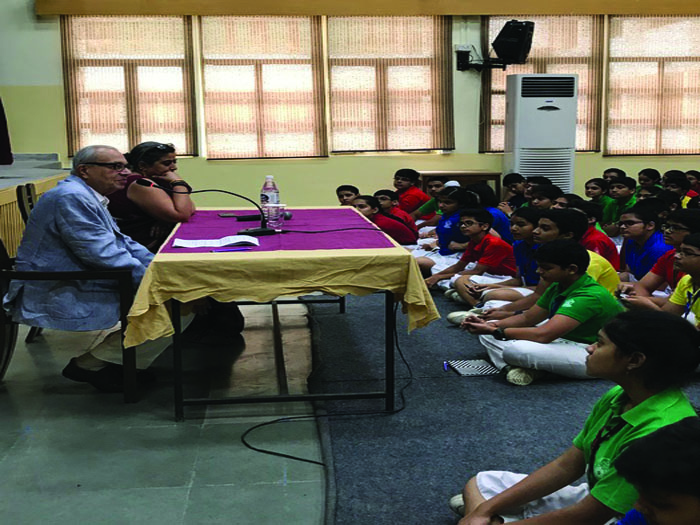Talk on Secularism by School chairman, Mr. Prafull Goradia
On 13 July 2017, a talk on the meaning of Secularism was conducted for senior school students conducted by School chairman, Mr. Prafull Goradia. Secularism is a topic that interests most of us, especially in todays times where religion is given such importance and often becomes a hot topic of debate on news' channels.
The Foundation Hall at School was the venue for the talk. It was evident from the great energy the hall was filled with, that it was going to be an interesting interaction. The students put across many questions that triggered their curiosity to know even more. Is secularism a western implant on Indian soil? Is secularism anti-religion? Does secularism show partiality? Does secularism pamper minorities? Answering many such questions, Mr. Goradia began by talking about the different kinds of secularism in the world.
[gallery link="file"]
He told us about British secularism which dealt with Henry VIII, the Tudor King of England whose self- indulgence became the root cause for the origin of secularism. In fact it was during this time that the first signs of a secular state were observed. Chairman Sir talked at length about the role of Anne Boleyn, the second wife of Henry VIII in the English Reformation. It was really interesting to know how Henrys desire for a male heir, forced him to attain an annulment of his first marriage, from the Catholic Church, so that he could marry Anne Boleyn. On not being granted permission, Henry secretly married Anne Boleyn. Later, Henry enforced the Act of Supremacy, which named Pope Clement VII, not the Pope, the supreme head of the Church in England. Eventually, this resulted in the creation of the Anglican Church.
Sir talked about Mustafa Kemal Ataturk, who was a Turkish army officer, revolutionary, and founder of the Republic of Turkey, serving as its first President from 1923 until his death in 1938. He told us how Ataturk was a secularist whose policies and beliefs became known as Kemalism.
Mr. Goradia shed light on the French concept of secularism that encourages the absence of religious involvement in government affairs. "Laicit", or French-style secularism is an ideology defining what it means to be French.
Sir spoke about the Nehruvian Secularism. He said that the constitution of India contains Jawaharlal Nehrus philosophy of a religion-neutral state. Sir told us how Nehru wanted equal protection by the State to all religions. His idea of a secular state was one that protects all religions, but does not favour one at the expense of others and does not adopt any religion as the state religion. However, Nehru was not in favour of a complete separation between religion and state and said that a secular state can intervene in matters of religion to bring about social reform.
Talking about tue Marxist views of secularism, Mr. Goradia said that the Marxists support the idea of a complete separation of religion from the state and from civil society and that, education, government, the courts and all aspects of public service should have no connection at all with religious practice. In fact, Karl Marx said ,Religion is the opium of the people. He believed that religion had certain practical functions in society that were similar to the function of opium for a sick or injured person. It reduced people's immediate suffering and provided them with pleasant illusions, but it also reduced their energy and their willingness to confront the heartless reality that capitalism forced them into.
Finally, Mr. Goradia shared some of his personal experiences that gave us a basis to form our own opinions on the idea of secularism.
The talk left us with a lot of information that would greatly help us shape into responsible citizens and champions of the idea of secularism in the truest sense. We thank Sir for his tireless efforts in making the time to speak with us and enlightening us on some many diverse perspectives.
Mirambika Mukherjee, XI D.













